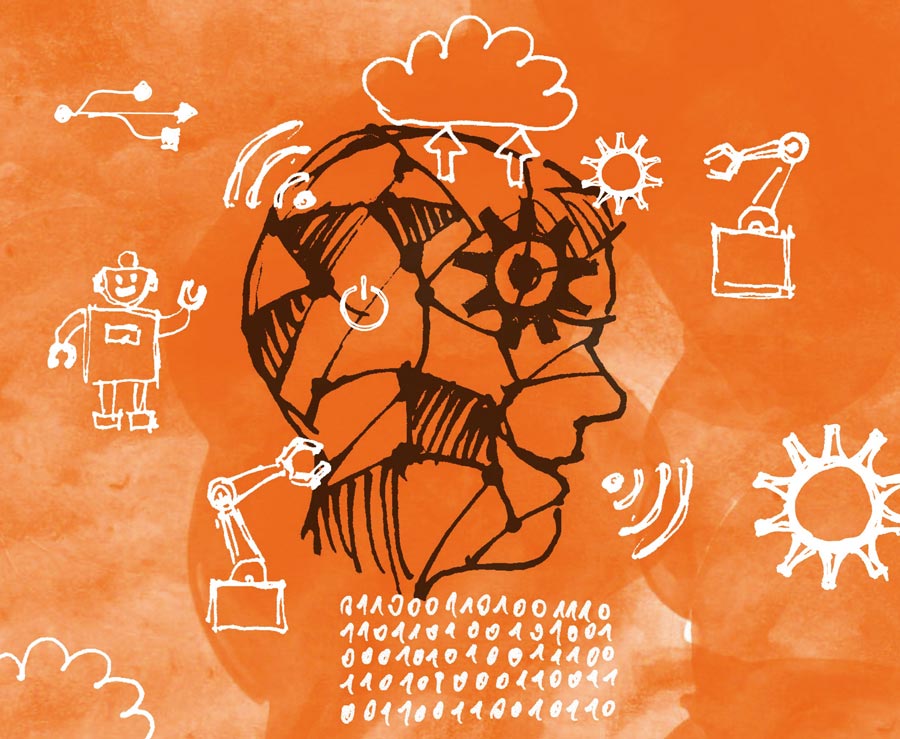By Dr.-Ing. Olaf Sauer, Business Unit Automation / Deputy Head of the Institute Fraunhofer Institute for Optronics, Systems Engineering and Image Evaluation (IOSB).
One significant feature of Industrie 4.0 is the consistent networking and penetration of all factory components as well as complete value-added chains with sensor technology, embedded systems and communication technology – which is called cyber-physical systems. This results in large amounts of data, usually generated by machines, ranging from planning the products to be manufactured and the production resources to actual production and the uses of the products. This data forms the basis of modern and powerful analysis and evaluation methods, which are called “artificial intelligence” (AI) today. AI procedures are capable of “coping with new situations successfully, processing new data or new information, drawing conclusions from the available knowledge, thus generating new knowledge (…) or solving new task.”[1] Today, it is widely accepted that AI is a key technology that allows all users to make use of large potentials for improvement in all stages of the value chain.
Even though current trials certify that Germany holds a good position in AI research, they also state that AI applications are far more competitive. China is making tremendous investment in Artifical Intelligence – and Chinese companies will enter the German market for AI applications in production in a few years. Therefore, the Federal Government is absolutely right to state, in the context of its AI strategy, that they intend to make Germany and Europe a leading AI location.[2] Industrial production is one of the most important fields of application in this context. Using Smart Factories and specific and challenging practical cases from our customers in industrial manufacturing, we have already started to develop innovative AI methods and tools, which will be briefly presented in the following sections.
Collection and use of data
In production, data always has to be interpreted in the context of the product or the processes. If this is the case, data forms precious resources to improve the value-added process or to develop new business models.[3] This also means that each practical case requires its specific data. For this very reason, it is so important to analyze the right, high-quality data. It is only under these preconditions that we can make efficient use of AI.
Our experience has shown that one of the major obstacles in the use of AI today is to extract the very data from the processes. We support you in gathering AI-relevant data from your machinery and equipment as well as their components. This data is either collected from the machine controls, the existing sensor systems of the machine and/or smart sensors that have been added later[4], which we will chose and install in cooperation with you. Together with you, we will specify the level of granularity required for a specific task and define how data from multiple sources can be integrated smoothly and in what format the data is transferred and stored. In this context, we make sure to select the right data for practical use, to sort existing data sets and to edit them for subsequent modelling.
Using our proven PLUGandWORK[5]-solution components, we also turn components and machinery into data suppliers which have not been networked yet.
In addition, we provide know-how in the fields of data security and data protection because a larger degree of networking includes a higher risk of cyber attacks. Today, however, we have a lot of technologies that ensure, when used in the right way, that you remain the owner of your data remains with you. The decisive factor is a tailor-made and secure IT architecture for collecting, storing and evaluating the data.
Machine learning
In production processes, we use machine learning to generate “knowledge“ from “experience” in a very general sense. Learning algorithms develop a complex model from sample data with the largest possible degree of representation. Subsequently, this model can be applied to new and potentially unknown data of the same kind. Whenever processes are too complicated to describe them in an analytic way, but there is a sufficient amount of sample data such as sensor data or images, machine learning is an appropriate method.[6] The models are matched with the data flow from operational business and ultimately enable forecasts or recommendations and decisions.
Examples of how machine learning can improve quality and reduce time or costs:
- Discovering anomalies in the behavior or machines or components because the procedures reliably discover deviancies from the normal behavior of a process and consequently enable predictive maintenance.
- Making better decisions in complex situations because the models can identify the complete connections spanning several manufacturing stages so they can be enhanced to serve as assistant systems.
- Adapting manufacturing and assembly processes to current situations quickly because clear correlations between measuring results and process parameters allow for automated control.
Further areas of application of machine learning which we are developing for our customers are human-robot cooperation, autonomous intralogistics and self-organization in manufacturing.
We support you in selecting the right learning and modelling algorithms, defining, editing and storing representative training data, generating meaningful models from the training data, then comparing these models with runtime data. All these tasks require appropriate sensor technology, software tools and architectures. We support you in establishing these issues in a future-proof and sustainable way.
Research on machine learning is proceeding. For example, the relevant issues are machine learning with extremely large or very small amounts of data, the combination of machine learning with physical or expert knowledge as well as security and transparency of machine learning models.
Autonomous Systems
One of the areas where Industrie 4.0 is applied in practice is ‚‘self-organizing production‘ Even in the first documents about Industrie 4.0 we can find the vision that “smart products (…) owing to ad hoc networking and possessing a digital product description are capable of navigating through production autonomously.”[7] The underlying idea is that workpieces, machines and conveyor systems negotiate the processing sequence in a decentralized way on the basis of a set of rules. This means that no central control unit has to calculate a plan in advance. If there are any disruptions, it is assumed that the participants can identify alternative solutions ad hoc – which is, in turn, faster that a central unit having to generate a new plan.
Some practical examples such as a cylinder head line in a motor plant have shown that these decentralized mechanisms deliver good results indeed. However, the flexibility that had to be added to machinery and conveyor systems was too expensive so at the end of the day the costs outweighed the positive effects.
Edge versus cloud computing
On the previous pages we have explained that meaningful applications of artificial intelligence require high-quality data which form the basis of generating models. But where will the produced data be processed or the models be learned in the future?
Currently it becomes apparent that “edge computer centers“ will take over this task. Edge computing means that computing power, software applications, data processing or services are transferred directly to the logical edge of a network, e. g. a line or a complete factory. Studies predict that edge computing will increase by roughly 30 % per year by the year 2025, owing to the large variety of data that can be expected, the required processing speed and power. Edge computer centers, inter-connected to form a cloud infrastructure, are thus scalable, also enabling medium-sized enterprises to use cloud technologies without having to invest in their own infrastructure.
Edge computer centers fulfill the following tasks, for example:
- Collecting and interpreting data from sensors and machine controls
- Machine learning of the models
- Comparisons between models and runtime data
- Storage of measuring data, e. g. image data from quality systems
- Calculation of machine parameters
- Other machine-related features, which are not relevant in real-time, however
What services does IOSB provide for its customers?
Data scientists, data analysts and machine learning specialists are hard to find these days. In cooperation with Fraunhofer Academy and Fraunhofer Alliance Big Data and AI we provide a certified training program as well as method and industry-specific training sessions.
Joint use of artificial intelligence
Trials have shown that targeted cooperation between enterprises and research institutions result in the faster development of new products, services and processes. In our ‘Enterprise Labs‘, team members of your organization will cooperate with Fraunhofer scientists and engineers on a daily basis in one team, which results in specific product and process innovations. In this process, your staff will contribute specific product and process know-how as well as the knowledge about the business processes of their market. Your team members will get a work place at IOSB, but they will also be able to perform defined project tasks at their ‘home workplace‘ in your enterprise. In this way, they also act as know-how multipliers in their original environment. Our scientists have a comprehensive technological know-how and application expertise relating to multiple industries. This cooperation leads to tailor-made results and even jointly developed business cases with measurable benefits. Our affinity with the Karlsruhe Institute of Technology (KIT) also enables us to include master or PhD students in your jobs.
Our smart factories and laboratories are the ideal environment for shopfloor-related AI projects. They have been equipped with state-of-the-art industrial components, ranging from sensor technology to cloud infrastructure and allowing future applications and products to be tested and improved under realistic conditions. Our in-house workshop will help you build prototypes and hardware so you will be able to get some first tangible results quickly. In addition, we ensure the required confidentiality with regard to visitors or competitors.
If, in addition, you would like to work on your own machinery and equipment, we will offer you another AI-related highlight starting in 2020 – the Karlsruhe Smart Factory. On an area of about 4,500 m² and in cooperation with partners from industry, we will orchestrate manufacturing processes, evaluate data and develop new AI-related solutions, helping immature processes, for example, get ready for series production. “Immature processes” refer to manufacturing processes that cannot be fully understood and mastered, either because they are new or process new materials or because it is not fully known which process parameters are responsible for the quality of the product. In the Karlsruhe Smart Factory, we will join our forces with you to find out which issues need to be addressed to ensure a continually high quality of the products. On the basis of machine learning and measurement and control technology, the machinery and equipment are to configure their process parameters ultimately on their own, e. g. when the quality of the products is deteriorating gradually or when the conditions in the environment change.
[1] PaiCE (Ed.): Study on the potential of artificial intelligence in manufacturing industry in Germany
[2] Strategy Artificial Intelligence oft he Federal Government, see www.ki-strategie-deutschland.de
[3] World Manufacturing Forum: The 2018 World Manufacturing Forum Report – Recommendations for the Future of Manufacturing.
[4] Werthschützky, R. (ed.): Sensor Technologien 2022. AMA Verband für Sensorik und Messtechnik (AMA association for sensor and measuring technolgoy) e.V., 2018
[5] see www.plugandwork.fraunhofer.de
[6] Fraunhofer Gesellschaft (ed.): Machine learning – an analysis of competences, research and application. Munich, 2018
[7] acatech (ed.): Recommendations for implementing the strategic initiative INDUSTRIE 4.0 securing the future of German manufacturing industry ; final report of the Industrie 4.0 working group, April 2013
Image: © IOSB



